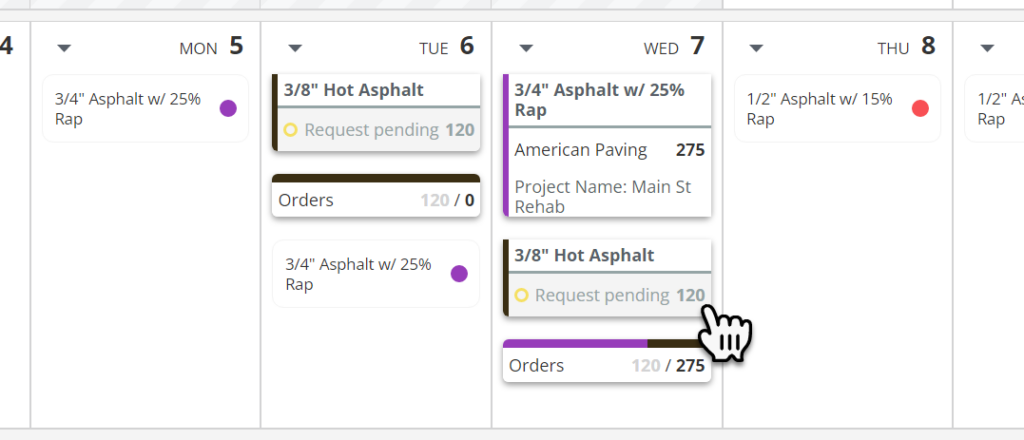
Are you running an asphalt, concrete, or quarry business and struggling to keep track of all the interactions you have with your customers? Do you wish there was a more efficient way to manage customer relationships and improve customer satisfaction? Look no further than implementing a CRM system in your business. In this article, we’ll explore the benefits of implementing a CRM system in your asphalt, concrete, or quarry business, and how it can help you streamline your processes, improve customer relationships, and ultimately grow your business.
What is a CRM System?
Before we dive into the benefits of a CRM system, let’s first define what it is. A CRM, or Customer Relationship Management, system is a software tool that helps businesses manage interactions with their customers, including customer data and communication. A CRM system typically includes features such as contact management, lead management, sales forecasting, and analytics, among others.
Benefits of Implementing a CRM System
Implementing a CRM system can provide a number of benefits for your asphalt, concrete, or quarry business. Here are just a few:
1. Improved Customer Relationships
One of the primary benefits of a CRM system is that it can help you improve your customer relationships. By tracking interactions with your customers and having all of their information in one place, you can better understand their needs and preferences, and tailor your communication and service accordingly. This can lead to increased customer satisfaction and loyalty. Features like the Customer Portal in PlantDemand are a great way to give your materials customers a way to request asphalt, concrete or aggregates. It also allows them to view their orders on a calendar.
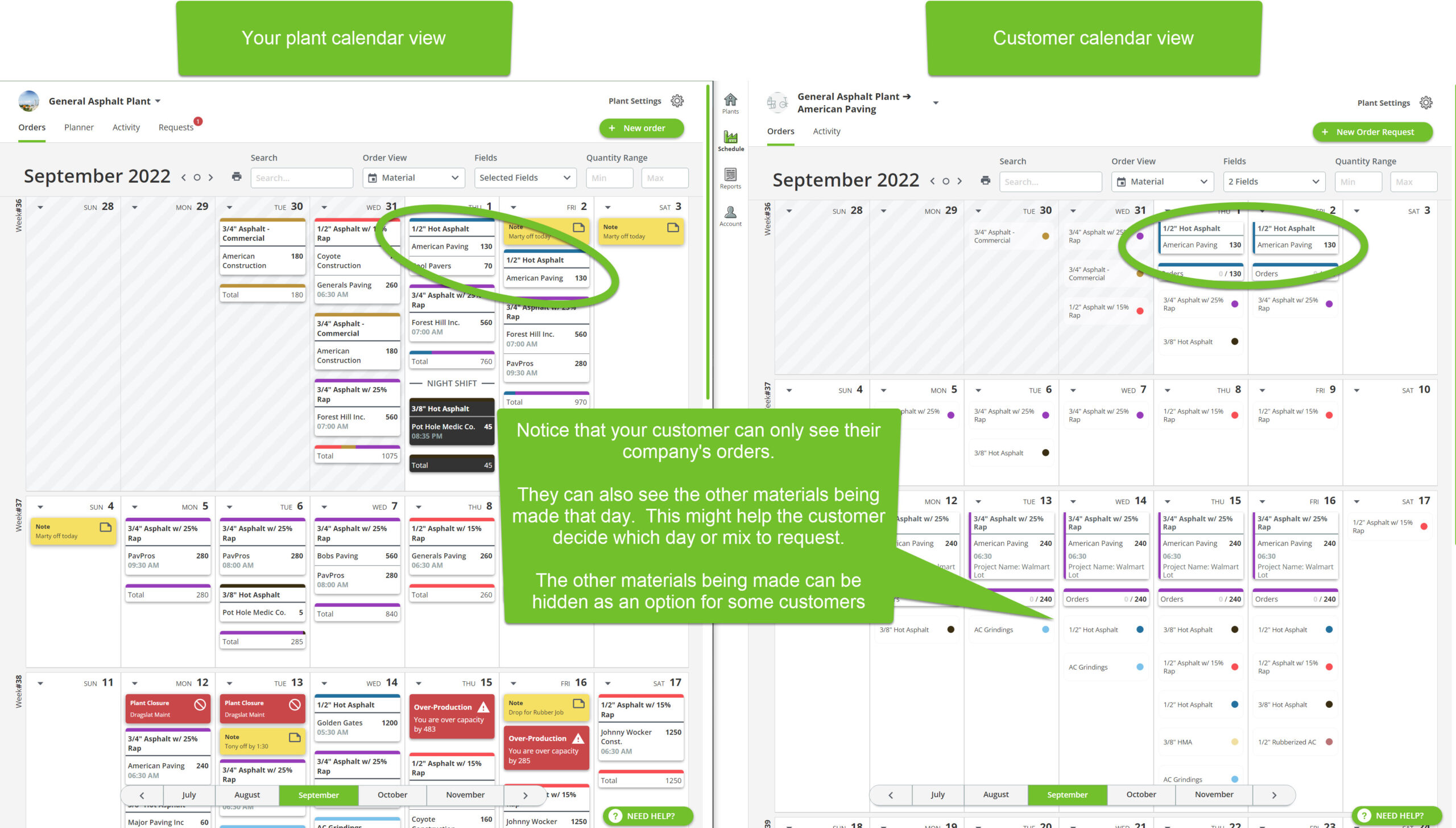
2. Streamlined Processes
A CRM system can also help you streamline your processes, making your business more efficient and effective. By automating tasks such as lead management and sales forecasting, you can free up time for your employees to focus on other important tasks. Additionally, having all customer data in one place can reduce the time and effort required to manage customer relationships.
3. Increased Sales
Another benefit of a CRM system is that it can help you increase sales. By providing your sales team with valuable customer data and insights, they can better target their efforts and close more deals. Additionally, a CRM system can help you identify cross-selling and upselling opportunities, increasing the lifetime value of your customers.
4. Better Data Analysis
A CRM system can also provide valuable insights into your business and customers through data analysis. By tracking customer interactions and sales data, you can identify trends and opportunities for improvement, and make data-driven decisions to grow your business.
5. Improved Collaboration
Finally, a CRM system can improve collaboration and communication within your business. By having all customer data in one place, all employees can access the same information and work together more effectively. This can lead to improved teamwork and ultimately better business outcomes.
How to Implement a CRM System for Asphalt Plants
Now that we’ve explored the benefits of a CRM system, how do you go about implementing one in your asphalt, concrete, or quarry business? Here are a few steps to get started:
1. Define Your Objectives
Before implementing a CRM system, it’s important to define your objectives and what you hope to achieve with the system. This will help you choose the right CRM solution and tailor it to your specific needs.
2. Choose a CRM Solution
There are a variety of CRM solutions on the market, each with their own strengths and weaknesses. Do your research and choose a solution that aligns with your objectives and budget.
3. Train Your Employees
Implementing a CRM system requires buy-in and training from your employees. Make sure they understand the benefits of the system and how to use it effectively.
4. Integrate with Other Systems
A CRM system should be integrated with other systems within your business, such as your accounting or project management software, to ensure a seamless
flow of data across all systems. This will further improve efficiency and accuracy of data.
5. Customize and Configure
Once you have chosen a CRM solution, it’s important to customize and configure it to meet your business needs. This includes setting up workflows, defining fields, and creating reports that will provide you with valuable insights into your business.
6. Monitor and Refine
Implementing a CRM system is not a one-time task. It’s important to continually monitor and refine your processes to ensure that you’re getting the most out of the system. This includes regularly analyzing data and making adjustments to your workflows and configurations as needed.
Conclusion
In conclusion, implementing a CRM system can provide a number of benefits for your asphalt, concrete, or quarry business, including improved customer relationships, streamlined processes, increased sales, better data analysis, and improved collaboration. By following the steps outlined above, you can successfully implement a CRM system in your business and start reaping the benefits today.
FAQs
- What is a CRM system?
A CRM, or Customer Relationship Management, system is a software tool that helps businesses manage interactions with their customers, including customer data and communication.
- How can a CRM system improve customer relationships?
By tracking interactions with your customers and having all of their information in one place, you can better understand their needs and preferences, and tailor your communication and service accordingly. This can lead to increased customer satisfaction and loyalty.
- How can a CRM system help increase sales?
By providing your sales team with valuable customer data and insights, they can better target their efforts and close more deals. Additionally, a CRM system can help you identify cross-selling and upselling opportunities, increasing the lifetime value of your customers.
- How do I choose a CRM solution?
Do your research and choose a solution that aligns with your objectives and budget. Consider factors such as ease of use, scalability, and integration with other systems.
- Is implementing a CRM system a one-time task?
No, it’s important to continually monitor and refine your processes to ensure that you’re getting the most out of the system. This includes regularly analyzing data and making adjustments to your workflows and configurations as needed.
- Requesting Asphalt and Aggregate From Your Plant – A Customer Portal Update
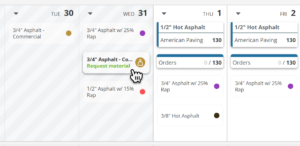 Customers can request asphalt and aggregates from your plant The Customer Portal was initially released in PlantDemand to allow customers to submit requests for mix to your plant. They could see the status of their request, and then see it on the calendar once a plant person approved it. While […]
Customers can request asphalt and aggregates from your plant The Customer Portal was initially released in PlantDemand to allow customers to submit requests for mix to your plant. They could see the status of their request, and then see it on the calendar once a plant person approved it. While […] - Creating Mix Designs and Materials in PlantDemand
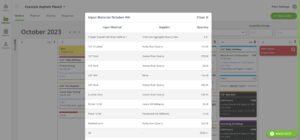 Create Mix Designs and Materials To create materials in PlantDemand, follow the steps below. Edit your mix designs periodically. Make output materials obsolete if your mix design has expired. This will make it so that it can no longer be scheduled, and will put an “Obsolete” tag to the front […]
Create Mix Designs and Materials To create materials in PlantDemand, follow the steps below. Edit your mix designs periodically. Make output materials obsolete if your mix design has expired. This will make it so that it can no longer be scheduled, and will put an “Obsolete” tag to the front […] - 8 Common Mistakes in Asphalt Software and Scheduling
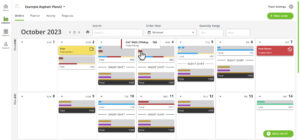 Key Takeaways Aspect Description Calendar Views While the Material View is the default when getting started, many users don’t explore PlantDemand’s other calendar views Important Custom Order Fields Your order form can have fields that are important to your plant and business. Select important fields to show on your calendar […]
Key Takeaways Aspect Description Calendar Views While the Material View is the default when getting started, many users don’t explore PlantDemand’s other calendar views Important Custom Order Fields Your order form can have fields that are important to your plant and business. Select important fields to show on your calendar […] - PlantDemand Upgrades Customer Portal for Streamlined Requests and Scheduling
 News Distribution: PlantDemand Upgrades Customer Portal for Streamlined Requests and Scheduling PlantDemand, the leading online asphalt plant scheduling software, announces the release of an updated version of its Customer Portal. The new and improved portal provides customers with an even more seamless and efficient way to request plant services and […]
News Distribution: PlantDemand Upgrades Customer Portal for Streamlined Requests and Scheduling PlantDemand, the leading online asphalt plant scheduling software, announces the release of an updated version of its Customer Portal. The new and improved portal provides customers with an even more seamless and efficient way to request plant services and […] - Ahorra tiempo, mejora la gestión de materiales y la programación de pedidos con PlantDemand
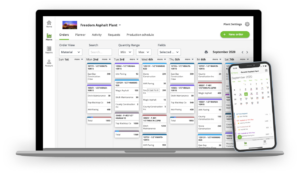 La nueva tecnología ayuda a simplificar las operaciones de las plantas de asfalto El software de asfalto PlantDemand mejora significativamente la gestión de materiales y la programación de pedidos, ahorrando tiempo y dinero Por JESSICA LOMBARDO 24 DE ENERO DE 2022 Los empleados de las plantas de asfalto saben que […]
La nueva tecnología ayuda a simplificar las operaciones de las plantas de asfalto El software de asfalto PlantDemand mejora significativamente la gestión de materiales y la programación de pedidos, ahorrando tiempo y dinero Por JESSICA LOMBARDO 24 DE ENERO DE 2022 Los empleados de las plantas de asfalto saben que […]
Sources:
- AsphaltPro Magazine: https://theasphaltpro.com/articles/tag/customer-relationship-management/
- Asphalt Contractor Magazine: https://www.asphaltcontractor.com/keywords/1711-crm
- Asphalt Pavement Magazine: https://www.asphaltpavement.org/index.php?option=com_content&view=article&id=1697:the-value-of-a-customer-relationship-management-crm-system&catid=105:best-practices&Itemid=105
- National Asphalt Pavement Association: https://www.asphaltpavement.org/index.php?option=com_content&view=article&id=1697:the-value-of-a-customer-relationship-management-crm-system&catid=105:best-practices&Itemid=105